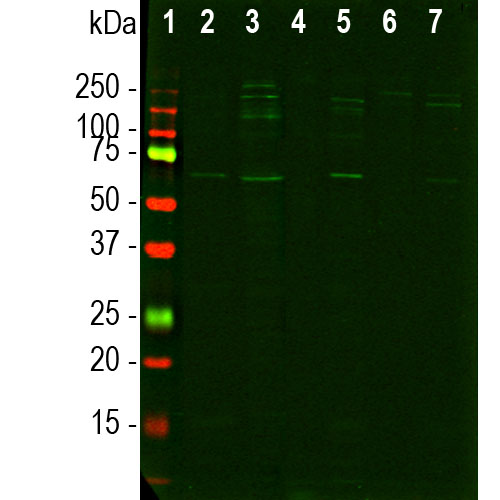| Name: | Mouse Monoclonal to the Nuclear Pore Complex |
| Immunogen: | Yeast nuclear preparations |
| HGNC Name: | NA |
| UniProt: | P39685 |
| Molecular Weight: | ~62kDa |
| Host: | Mouse |
| Isotype: | IgG1 |
| Species Cross-Reactivity: | Human, rat, mouse, cow, pig, horse, chicken, Drosophila, Caenorhabditis, Yeast |
| RRID: | AB_2186243 |
| Format: | Concentrated hybridoma cell culture media supernatant plus 5mM NaN3 |
| Applications: | WB, IF/ICC |
| Recommended Dilutions: | WB: 1:100, IF/ICC: 1:100-1:500 (yeast cells), 1:50-1:100 (mammalian cells). IHC: 1:2 |
| Storage: | Store at 4°C for short term, for longer term at -20°C. Avoid freeze/thaw cycles. |

Immunofluorescent analysis of HeLa cells stained with panspecificmouse mAb to the nuclear pore complex (NPC), MCA-39C7, dilution 1:100 in red, and costained with chicken pAb to vimentin, CPCA-Vim, dilution 1:10,000, in green. The blue is DAPI staining of nuclear DNA. The MCA-39C7 antibody reveals strong granular staining of the nuclei corresponding to the NPC, while the CPCA-Vim antibody specifically labels intermediate filaments in these cells.

Western blot analysis of different cell lysates, cytosol or nuclear enriched fractions using pan-specific mouse mAb to the nuclear pore complex (NPC), MCA-39C7, dilution 1:100 in green: [1] protein standard (red), [2] HEK293 cytosol, [3] HEK293 nuclear, [4] NIH-3T3 cytosol, [5] NIH-3T3 nuclear, [6] HeLa cytosol, and [7] HeLa nuclear fraction lysate. The band at about 68kDa represents a currently unidentified NPC protein which is detected predominantly in the nuclear enriched fractions of all cell lines.
Pan Specific Nuclear Pore Complex Mouse Monoclonal Antibody
Cat# MCA-39C7
$120.00 – $800.00
Nuclear pores form a barrier between the nucleus and cytoplasm in eukaryotiuc cells allowing regulated inflow and egress of proteins and RNA. They are composed of a family of nuclear pore proteins called nucleoporins with about 30 members in humans (1,2). This monoclonal antibody was raised by injecting mice with crude yeast nuclear preparations and screening the resulting hybridomas by immunofluorescence on yeast cells. The MCA-39C7 clone produced antibody which was one of several which strongly and specifically labelled nuclear pore complexes. When this antibody was tested on cells from other species, including rat, mouse and human cells, it has invariably strongly stained nuclear pore complexes, so it appears to bind to a highly conserved epitope and there to be an excellent and useful panspecific marker for these important structures.
Previous studies have not revealed convincing western blot data for this antibody, so the original immunogen was not known. We recently tested MCA-39C7 on western blots of mammalian cells binding to a ~62kDa protein and some higher molecular weight bands found in nuclear preparations of HeLa and other mammalian cells. We are currently unsure of the exact identity of these proteins, and work is in progress to to identify them. We note that the Mab 414 antibody described by Davis and Blobel has very similar properties (3). The antibody works well for western blotting and for IF, ICC and IHC on mammalian tissues (for IHC see data under “Additional Info” tab). For immunofluorescence on yeast cells, try MCA-39C7 diluted 1:100 to 1:500. For immunofluorescence on mammalian cells try at 1:50 to 1:100. Mouse select image at left for larger view.
Chromogenic immunostaining of a NBF fixed paraffin embedded human brain cortex section with mouse mAb to the nuclear pore complex, MCA-39C7 supernatant, dilution 1:2, detected in DAB (brown) following the ImmPress method with citra buffer retrieval. Hematoxylin (blue) was used as the counterstain. The nuclear pore complex antibody labels nuclei in a granular pattern that concentrates at the nuclear membrane. This antibody performs well in testing with both 4% PFA and standard NBF fixed tissues. Mouse select image for larger view.
1. Cronshaw JM, et al. Proteomic analysis of the mammalian nuclear pore complex. J. Cell Biol.158:915-27 (2002).
2. Alber F, et al. The molecular architecture of the nuclear pore complex. Nature 450:695-701 (2007).
3. Davis LI, Blobel G. Identification and characterization of a nuclear pore complex protein. Cell 45:699-709 (1986).
Related products
-

Mouse Monoclonal Antibody to Pdi1p
$120.00 – $800.00
Cat# MCA-38H8Select options This product has multiple variants. The options may be chosen on the product page -

Mouse Monoclonal Antibody to TAF15
$120.00 – $800.00
Cat# MCA-4D71Select options This product has multiple variants. The options may be chosen on the product page -

Mouse Monoclonal Antibody to DJ1/PARK7
$120.00 – $800.00
Cat# MCA-4H4Select options This product has multiple variants. The options may be chosen on the product page -

Mouse Monoclonal Antibody to GAPDH
$120.00 – $800.00
Cat# MCA-1D4Select options This product has multiple variants. The options may be chosen on the product page
Contact info
EnCor Biotechnology Inc.
4949 SW 41st Boulevard, Ste 40
Gainesville
Florida 32608 USA
Phone: (352) 372 7022
Fax: (352) 372 7066
E-mail: admin@encorbio.com



